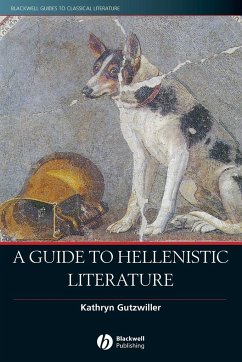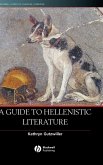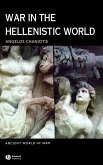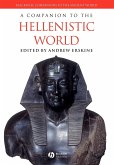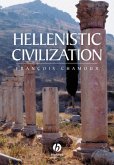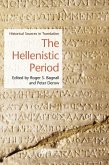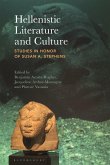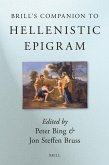This book is a guide to the extraordinarily diverse literature of the Hellenistic period.A guide to the literature of the Hellenistic age, from the death of Alexander the Great in 323 BCE to the Battle of Actium in 31 BCProvides overviews of the social, political, intellectual and literary historical contexts in which Hellenistic literature was producedIntroduces the major writers and genres of the periodProvides information about style, meter and languages to aid readers with no prior knowledge of the language in understanding technical aspects of literary GreekDistinctive in its coverage of current issues in Hellenistic criticism, including audience reception, the political and social background, and Hellenistic theories of literature
This book is a guide to Greek literature of the Hellenistic period, from the death of Alexander the Great in 323 BCE to the Battle of Actium in 31 BCE. It demonstrates how, during this period, Greek culture spread to Egypt and the Near East, was adapted and absorbed by the Romans, and produced an extraordinarily diverse literature, ranging from the comedy of Menander to the intricately wrought epigrams of Callimachus, from Apollonius' epic Argonautica to the great historical work of Polybius. The book helps readers to find their way through this remarkable but complex body of work. It situates Hellenistic literature in its historical and cultural contexts, introduces the major writers and genres of the period, and explains the major critical trends in current scholarship on the subject. Information about style, meter, and language aids readers with no prior knowledge in understanding technical aspects of literary Greek. All ancient Greek words are transliterated, and literary passages are quoted in translation.
Hinweis: Dieser Artikel kann nur an eine deutsche Lieferadresse ausgeliefert werden.
This book is a guide to Greek literature of the Hellenistic period, from the death of Alexander the Great in 323 BCE to the Battle of Actium in 31 BCE. It demonstrates how, during this period, Greek culture spread to Egypt and the Near East, was adapted and absorbed by the Romans, and produced an extraordinarily diverse literature, ranging from the comedy of Menander to the intricately wrought epigrams of Callimachus, from Apollonius' epic Argonautica to the great historical work of Polybius. The book helps readers to find their way through this remarkable but complex body of work. It situates Hellenistic literature in its historical and cultural contexts, introduces the major writers and genres of the period, and explains the major critical trends in current scholarship on the subject. Information about style, meter, and language aids readers with no prior knowledge in understanding technical aspects of literary Greek. All ancient Greek words are transliterated, and literary passages are quoted in translation.
Hinweis: Dieser Artikel kann nur an eine deutsche Lieferadresse ausgeliefert werden.
"Kathryn Gutzwiller is a renowned and well-respected scholar, andher wide ranging publications have contributed greatly to the risein scholarly estimation that the field now enjoys. Accordingly a guide to the subject by such a knowledgeable andinfluential specialist is both a timely and welcome addition to thehandbooks and companions to classical authors already available."(Journal of the Classical Association of Canada, Winter2009)
"This book is likely to dispel more of the inherited prejudiceagainst Hellenistic literature. The guide is rich in detail andsuccinct comments, yet very readable ... .Gutzwiller manages togive life (albeit brief in most cases) to the prominent writers ofthis period." (Scholia Reviews, 2009)
"Kathryn Gutzwiller's [Guide to Hellenistic Literature]is exceptionally good...Gutzwiller covers a lot of ground innot very much space, without the exposition ever appearing eitherskimpy or cramped, and gives a good sense of the breadth anddiversity of Hellenistic literature (not just poetry), along with abasic understanding of the historical, social, and culturalcontext. This is a model of the genre." (Greece andRome, Vol 55 No. 2 2008)
"An up-to-date handbook on the literature of the period from thedeath of Alexander to the Roman conquest of Egypt -- something longneeded in the field of Classics. As one of the leading scholars ofHellenistic poetry in North America, Gutzwiller has helped to shapethe discourse of the critical issues in that field, and herpresentation of poets and poetry in this guide is alwayswell-informed and interesting. But what makes this guide sovaluable to the classical community as a whole is the broad scopeof the literature it presents ... .Students of Greekliterature, from undergraduates to specialists, will findinteresting observations and connections throughout the guide. NoClassicist should be without it. This guide consistently offerselegant proof of how modern discoveries and the application ofcritical theories have enriched our knowledge and appreciation ofHellenistic literature. Gutzwiller's guide expertly summarizes whatwe know about this period's literature, charts scholarly approachesto it, and should -- I hope -- help to plot the path for futureresearch." (Bryn Mawr Classical Review, November 2008)
"Gutzwiller serves as an expert eyewitness to literaturewhich is, at the least, complex even for classicists and, moreoften, wholly inaccessible to the non-scholarly reader. Like anytravel guide, such a tour cannot replace what it describes, but israther an invitation to visit the sites on one's own. More than anyother book available today, [it] opens the door to this rich andexciting period of Greek literary history." (New EnglandClassical Literature)
"An internationally recognized authority, Gutzwilleroffers an engaging and stimulating guide to the field. This elegantand useful guide has much to offer both new and long-standingreaders of Hellenistic literature." (ChoiceMagazine)"Simply said, this is a superb book. It is fresh, readable,and liberated from the necessity of making a pronouncement on everytired, scholarly controversy. Instead it dares to take a wide viewof Hellenistic literature that forges connections between poetryand politics, literature and art, and science with all of theforegoing. A better guide to the subject is impossible toimagine."
-Dee L. Clayman, City University of New York
"This book is likely to dispel more of the inherited prejudiceagainst Hellenistic literature. The guide is rich in detail andsuccinct comments, yet very readable ... .Gutzwiller manages togive life (albeit brief in most cases) to the prominent writers ofthis period." (Scholia Reviews, 2009)
"Kathryn Gutzwiller's [Guide to Hellenistic Literature]is exceptionally good...Gutzwiller covers a lot of ground innot very much space, without the exposition ever appearing eitherskimpy or cramped, and gives a good sense of the breadth anddiversity of Hellenistic literature (not just poetry), along with abasic understanding of the historical, social, and culturalcontext. This is a model of the genre." (Greece andRome, Vol 55 No. 2 2008)
"An up-to-date handbook on the literature of the period from thedeath of Alexander to the Roman conquest of Egypt -- something longneeded in the field of Classics. As one of the leading scholars ofHellenistic poetry in North America, Gutzwiller has helped to shapethe discourse of the critical issues in that field, and herpresentation of poets and poetry in this guide is alwayswell-informed and interesting. But what makes this guide sovaluable to the classical community as a whole is the broad scopeof the literature it presents ... .Students of Greekliterature, from undergraduates to specialists, will findinteresting observations and connections throughout the guide. NoClassicist should be without it. This guide consistently offerselegant proof of how modern discoveries and the application ofcritical theories have enriched our knowledge and appreciation ofHellenistic literature. Gutzwiller's guide expertly summarizes whatwe know about this period's literature, charts scholarly approachesto it, and should -- I hope -- help to plot the path for futureresearch." (Bryn Mawr Classical Review, November 2008)
"Gutzwiller serves as an expert eyewitness to literaturewhich is, at the least, complex even for classicists and, moreoften, wholly inaccessible to the non-scholarly reader. Like anytravel guide, such a tour cannot replace what it describes, but israther an invitation to visit the sites on one's own. More than anyother book available today, [it] opens the door to this rich andexciting period of Greek literary history." (New EnglandClassical Literature)
"An internationally recognized authority, Gutzwilleroffers an engaging and stimulating guide to the field. This elegantand useful guide has much to offer both new and long-standingreaders of Hellenistic literature." (ChoiceMagazine)"Simply said, this is a superb book. It is fresh, readable,and liberated from the necessity of making a pronouncement on everytired, scholarly controversy. Instead it dares to take a wide viewof Hellenistic literature that forges connections between poetryand politics, literature and art, and science with all of theforegoing. A better guide to the subject is impossible toimagine."
-Dee L. Clayman, City University of New York

